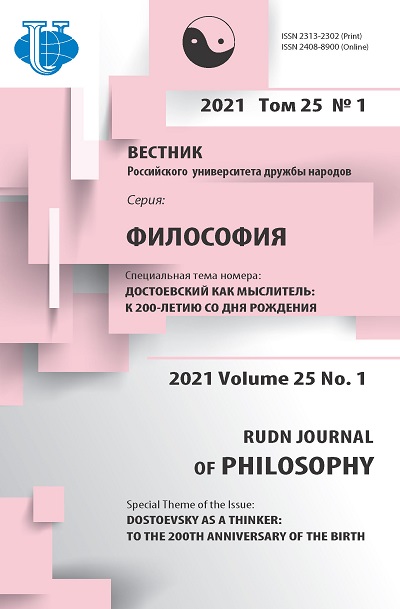Hermeneutics of Aristotle and Hermeneutics of Sophists in Terms of Dialogue Philosophy. Part II. From Sophists to Modernity
- Authors: Dvorkin I.1
-
Affiliations:
- Hebrew University of Jerusalem
- Issue: Vol 25, No 1 (2021): DOSTOEVSKY AS A THINKER: TO THE 200TH ANNIVERSARY OF THE BIRTH
- Pages: 103-120
- Section: PHILOSOPHY OF DIALOGUE
- URL: https://journals.rudn.ru/philosophy/article/view/25915
- DOI: https://doi.org/10.22363/2313-2302-2021-25-1-103-120
Cite item
Full Text
Abstract
The article considers the logical and philosophical doctrine of sophists, which, according to some modern researchers, was more philosophical than their ancient critics recognized. A comparison of the provisions of Aristotle's hermeneutics with preserved fragments of Protagoras and Gorgias shows that the doctrine of sophists was a kind of holistic philosophy, which anticipated the philosophy of dialogue of the XX century. Despite the fact that the philosophy of Plato and Aristotle tried to overcome the relativism and anti-ontologism of the doctrine of sophists, some elements of its dialogism were preserved in subsequent philosophy in dialectics and rhetoric. The first thing you should pay attention to is the difference between the dialogical form of the presentation of philosophy in Plato and dialogue as the fundamental basis of thinking that we find among sophists. The dialogism preserved in the dialectic of Plato and the rhetoric of Aristotle is more a technical method of convincing the interlocutor than a hermeneutical basis, which it is in the philosophy of dialogue and in the method of Socratic discussion. The linguistic turn that occurred in the philosophy of the 20th century includes not only an increased interest in language and accuracy of expression. No less important is the new formulation of the question of the nature of the language. Is language a tool for the formulation of thought as Aristotle believed and followed by representatives of modern analytical philosophy, or does it have its own fundamental status, as representatives of the philosophy of dialogue believe? In this context, it is very important for the philosophy of dialogue to find in the thinking of the pre-Socratics those predecessors who already charted the paths for modern thought two and a half thousand years ago. The second part of the article discusses the forms of the dialogic thinking that have survived in philosophy after the sophists and the role of the sophists' hermeneutics in the formation of modern philosophy of dialogue.
Keywords
About the authors
Ilya Dvorkin
Hebrew University of Jerusalem
Author for correspondence.
Email: idvorkin@mail.ru
Director of the Educational Programs, International Center for University Teaching of Jewish Civilization
Mt. Scopus, Jerusalem, 9190501, IsraelReferences
- Dvorkin I. Hermeneutics of Aristotle and Hermeneutics of Sophists in Terms of Dialogue Philosophy. Part 1. RUDN Journal of Philosophy. 2020. 24(3): 480—501. doi: 10.22363/ 2313-2302-2020-24-3-480-501. (In Russian).
- Rosenzweig F. Das neue Denken. Eine nachträgliche Bemerkung zum "Stern der Erlösung". Der Morgen: Monatsschrift der Juden in Deutschland; 1925. S. 426—451.
- Dvorkin IS. Towards a philosophy of dialogue. In: Tolerantnist' ta dialog v suchasnomu sviti. Kiev: Filosofs'ki dialogi'; 2013. P. 112—171. (In Russian).
- Rossetti L. Le dialogue socratique. Paris: Les Belles Lettres; 2011.
- Dillon J. The Middle platonists 80 BC—220 AD. Saint Petersburg: O Abyshko — Aleteya Publ.; 2002. (In Russian).
- Havelock E. Preface to Plato. Cambridge, MA: Harvard U. Press; 1963.
- Poulakos J. Sophistical rhetoric in classical Greece. Columbia, S.C.: University of South Carolina; 1995.
- Schiappa E. Protagoras and logos: a study in Greek philosophy and rhetoric. Columbia, S.C.: University of South Carolina Press; 2003.
- Poma A. The critical philosophy of Hermann Cohen. Moscow: Akademicheskij Proekt; 2012. (In Russian).
- Cohen H. Logik der reinen Erkenntnis. Berlin: Cassirer; 1902.
- Klatzkin J. Thesaurus philosophicus linguae hebraicae et veteris et recentioris. Vol. II. Berlin: Eschkol Verlag; 1928. (In Hebrew).
- Aristotle. Topics. In: Aristotle. Collected works. Vol. 2. Moscow: Mysl' Publ.; 1978. Р. 347—531. (In Russian).
- Brentano TF. Ancient and modern sophists. Saint Petersburg: Sinodal'naya Tipografiya; 1886. (In Russian).
- Dvorkin IS. Between Prophecy and Pure Reason: How is Jewish Philosophy Possible. Judaica Petropolitana. 2015;(3): 10—33. (In Russian).
- Dienstag JI, editor. Studies in Maimonides and St. Thomas Aquinas. New York: Ktav; 1975.
- Cassin B. Effect of sophistry. Trans. from French by L Rossius. Moscow; Saint Petersburg: Moskovskiy filosofskiy fond Universitetskaya kniga, Kulturnaya initsiativa Publ.; 2000. (In Russian).
- Poma A. Cadenzas. Philosophical Notes for Postmodernism. Cham: Springer; 2017.
- Deleuze G. Difference and Repetition. Saint Petersburg: TOO TK "Petropolis"; 1998. (In Russian).
- Belov VN. Is Research on Postmodernism Still Relevant? Thoughts on a Book by the Italian Philosopher A. Poma (Rev.: Poma A. Cadenzas. Philosophical Notes for Postmodernism. Cham: Springer, 2017, 244 pp.), translated by AS Kiselev. Kantian Journal. 2018;37(3): 97—102. http://dx. doi. org/10.5922/0207-6918-2018-3-5 (In Russian).
- Makhlin VL. Tozhe razgovor. [Also talk]. Bakhtinskiy sbornik. V. Moscow: Yazyki slovyanskikh kultur; 2004. (In Russian).
- Bibler VS. From the Science of Knowledge to the Logic of Culture: Two philosophical introductions to the twenty-first century. Moscow: Politizdat; 1990. (In Russian).
















